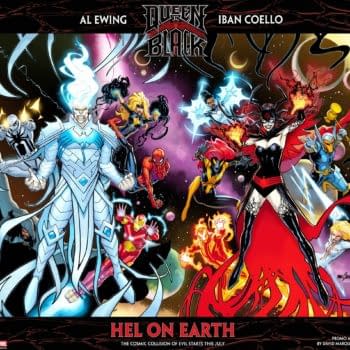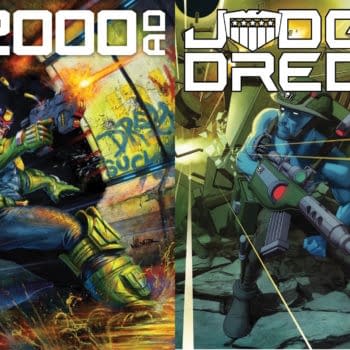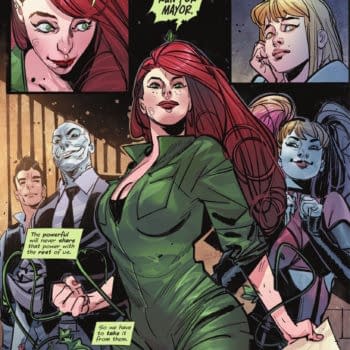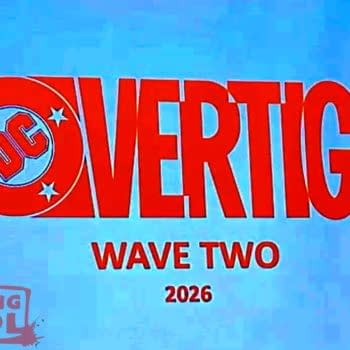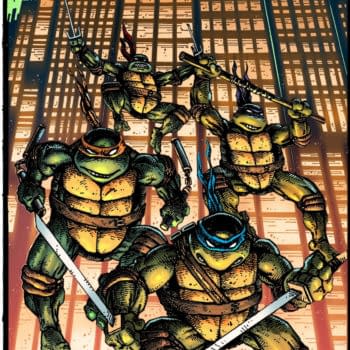Posted in: Comics, Look! It Moves! by Adi Tantimedh, Recent Updates | Tagged: Comics, spandex
Look! It Moves! by Adi Tantimedh: The Spandex Special
Adi Tantimedh writes;
The seventh issue of Martin Eden's gay superhero team comic SPANDEX has been released this month, marking the end of the series barring a final special issue due out next year.
SPANDEX is part of the post-Alan Moore, post-Grant Morrison wave of "How the British do Superheroes" that we've been seeing in recent TV shows like NO HEROICS and MISFITS, though Martin Eden has been swimming in those waters longer than most. Throughout the 1990s, he wrote and drew the indie superhero comic THE O MEN before taking about break in the last few years to create SPANDEX.
I'm a big fan of THE O MEN and SPANDEX, having plugged it previously. Now that the final issue is out, it's worth talking about again. SPANDEX is an important comic not because of its unique take on the LGBT superhero comic, but for everything else it stands for: an intensely personal comic that uses genre as a means of self-expression that has social and political dimensions that is witty and fun. The writing and storytelling are as good as, if not better than the majority of mainstream superhero comics being published by Marvel or DC. It wears its influences from Marvel and DC superteam books on its sleeve but makes those its own, filtering them through personal experience using genre conventions to shed fresh light on personal experiences, even if the characters wear costumes, fight pink ninjas and have superpowers. It understands how deep and rounded characters earn fannish devotion, and the characters speak and feel like people you might actually know in life, here wearing spandex and fighting crime. It runs the gamut of superhero plots and subplots, charting the rise and fall of a superteam in seven issues with more twists and turns than most DC or Marvel arcs do in twenty issues. It's upfront about the characters' sexuality and wanting to have sex in a way that mainstream comics ever dare to be, is honest and direct to the point where it becomes its own fanfic and slashfic. Every panel of the comic is filled with the creator's love of comics.
SPANDEX is a completely self-published comic where Martin Eden writes, draws, colours, letters, and pays for the printing costs all himself while holding down a day-job as an editor. It's a prime example of the indie 'zine ethos where creators completely self-publish and do the old-fashioned way of selling: by going to conventions and setting up a stall, placing books in comics shops, plugging on the internet through social media and website coverage, by interacting with fans one-on-one. Buying the comic means the money goes right to the creator and not a publishing company. Each copy of the comic comes with little free extras like badges or bonus minicomics, lending it that extra feeling of personal investment. SPANDEX is about believing in the dream and the joy of comics.
I interviewed Martin Eden briefly to talk about his influences and the background of the series.
Both O MEN and SPANDEX feel like you've been bursting to tell your interpretation of superhero team comics, specifically the classic Claremont-Byrne run of UNCANNY X-MEN and Wolfman-Perez run of NEW TEEN TITANS, which established a lot of plot conventions and imagery. Can you talk about their influence on you?
When I was growing up, I adored Claremont's X-Men run, and the Wolfman-Perez Teen Titans. There's nothing out there now like those comics, so I'm doing my own spin on it, creating the kind of comic I'd want to read myself (but with added naughtiness).
I discovered Teen Titans first – a schoolfriend lent me Teen Titans 43, where Terra has taken down the Titans and Robin/Nightwing is trying to figure it all out. I mean, if you look at Spandex #5, where Liberty is trying to figure out what happened to her team-mates, you can see the influence! That Titans issue was one of the most incredible, sophisticated things I've ever read. Imagine discovering that when you're 11.
Claremont was a genius. I was growing up in the 80s/90s, reading these comics. A lot of people around me was telling me I was stupid for reading comics, and yet I was reading this mature, sprawling, intelligent soap opera. They don't make them like that anymore.
What sets SPANDEX apart is that you've assimilated it into something more personal and political with a small 'p'. It's also more focused than O MEN. Can you talk a bit about how you write the characters to reflect certain emotional and social realities even though they're superheroes?
I think the key to my comics is that they're not just about the superheroics, they're more about the characters and the character moments. You don't often get a comic like Spandex that is from the heart and deals with sexuality, and actually tries to provoke emotions in the readers.
Grant Morrison is a huge influence, and I really like his small character moments. He writes big ideas and crazy scenarios, but for me it's the quiet, personal moments that resonate the most. That's what I aim for. When Ragged Robin and Dane hug in the future scenes in The Invisibles, or when Zenith breaks down when he's fighting his father.
Spandex, for me, is about getting things off my chest, but not in an over-bearing way. I comment and then I move on. It's out of my system. It's therapeutic!
Many readers like to deny there are any social or political themes in stories unless they're explicit. You've made LGBT characters and their emotional lives implicit in SPANDEX and O MEN without spelling it out. SPANDEX takes the superhero genre and equates the freedom of expressing one's identity with the characters' sexuality, and that in itself also equates it with creativity. What I find vital about SPANDEX is that it's specifically a joyful expression of your inner life and creativity.
My friend said to me the other day that Spandex is autobiographical. It is and it isn't. I don't particularly want to write an autobiographical comic as it's not fair on the other people involved, and it's too much self-exposure (although I do actually have something autobiographical in mind, possibly, in the future). But there's a lot of me in the comic, just very heavily disguised. Spandex is about where I am right now in life and what frustrates me, and what I want to say, but it's done subtly and often in one-liners. I don't want to get all political on people or tell people what to think.
There are also a lot of specifically British influences, in the approach and general attitude in the writing. Can you talk a bit about that?
I think it's another thing that makes Spandex quite unique – you have your American superhero comics, and then you have Spandex. My characters talk very differently to, say, the Avengers, and they act differently – they're more direct.
You also seem to be influenced by manga and anime. Or am I reading too much into that?
I still find manga a bit confusing and intimidating because there's so much of it out there. But you just have to wade in there and try things out and discover which creators you like. I'm into it in a big way now. I read and loved Akira a long time ago. Recently, I discovered Death Note, which led to Bakuman, and I adore the works of Naoki Urasawa – I'm reading Monster now. And Gantz is incredible.
I think manga gets a bad reputation – people seem to think it's samey and hasn't got much depth to it – but I think characters in a manga like Bakuman are some of the most realistic characters out there. And I love the pace of manga – it's very clever – very cinematic, like reading a movie. It's something I want to move towards in my own work.
Issue #3 is one of the best allegories about depression I've ever read. How did you come to write that one?
I wanted to do a 'serious' issue, and I wanted to put my characters through the wringer quite early on, to show that Spandex isn't just all about fun things. I was trying to come up with an idea for it – originally, it was going to be something involving their origins and a villain who manipulates it all and makes it all harrowing. Then I had a vision of Joanie with larger hair wearing a smart shirt and suit dress and she was very grey and serious. It spiraled from there, really – the idea of a world that has been completely subdued and oppressed by negativity. I wanted to address issues about struggling with life (whatever it is – it doesn't have to be depression), but more importantly, I wanted to try and show a way out.
Personally, I've struggled with anxiety and depression for a long time, and you have to find your own way through it all. I'm willing to help anyone going through something similar, and this is my attempt at that. I wanted to point out the good things in life. If I can put a smile on just one person's face with Spandex #3 or if I can make someone who's struggling feel slightly better, then I've achieved my aim.
So now that Spandex is pretty much done, barring an extra-sized annual later, how does it feel?
It's a relief to have told the story I wanted to tell. It's all out of my system now. I'm already thinking ahead to my next projects and planning them. But I also look back at the Spandex issues and think, "Gosh, did I do that?" It's like an outer-body experience – I'm 'in the zone' when I work. And it's even more extreme with The O Men, which I started around 15 years ago. I'm working on reprinting it all and I'm actually reading it and I want to know what happens next – because I can't remember!
Did you have all seven issues and the special worked out in your head from the start?
I had the vague shape of the series, but nothing concrete. I knew it would be six or seven issues. The thing is, when I was working on issues 1 to 3, they were taking a long time to physically do (all in all, together, they took 2 years) – so during that time, I'm planning ahead, and you can do a lot of planning in that time. You're drawing a scene or a character and thinking "oh what if they do this…". That's the beauty of it though. It just comes together like a massive jigsaw puzzle.
The scene between Ms. Fantastic and Alicia in Issue 7 was one of the most last-minute ideas I had. It spiraled out of a situation I had been in, and it was also a logical development in the story, since I wanted to explain why Alicia and Prowler's relationship didn't work. I think I only came up with that scene halfway through working on issue 6. Even the ending of issue 7, the stories of Luke, Jim and Indigo ended at a certain point, but it came into my mind to develop them further, and I'm glad I did. That's the fun of it, though. For me, writing is about spontaneity, logic and fluidity, and I enjoy that process.
SPOILER WARNING: The next question and answer contains a major revelation about issues #6 and #7.
Let's talk about God. Not the one in the Bible but your God. How did that idea come about?
Ha ha!
It was a combination of a lot of different things. When I started Spandex, I knew Diva was something special but I hadn't fully formulated what that was. Maybe, subconsciously, the Big Idea was a seed in my mind. It's like a lot of my writing – I have a vague idea and I head towards it and hope that something more concrete will develop – and thankfully, it usually does.
In my planning, the true identity of Diva went through some changes and developments. She was definitely something big. At first, she was going to be an 'opposites witch', a bit like the Scarlet Witch. Then The Idea just hit me like a bolt out of the blue. It's as simple as that. But at first she was going to be Jesus. A female Jesus Christ. At the end of Issue 6, Saga would have said "oh Jesus… Jesus Christ…" etc. But I felt funny about that, because we kind-of have seen images of Jesus and we think of him as having been a real person. I couldn't do that. Luckily, pretty instantaneously, the God idea hit me. I had sleepless nights about it for weeks. I really didn't know whether to go ahead with it. I thought I would get assassinated. In the end, I just thought "fuck it. Just do it."
With the storyline, I wanted to point out things about religion that are just stupid and hypocritical, especially in its attitudes to homosexuality. I'm getting things off my chest. But I also have some religious friends, so I wanted to do it in a way that wasn't too demeaning to them or their beliefs, and I didn't want to portray religion as all-negative.
Once Spandex is done and dusted, are you back to completing THE O MEN?
Pretty much. The last three years have been crazy and busy, so I'm hoping to wind down a bit now. I'm going to spend a year working on the Spandex Special, just taking my time with it and enjoying it. I should really have taken a break after Spandex #7, but no, I've already drawn about five pages of the Special.
I will be releasing the next two O Men reprint books over the next two years, which isn't as straight-forward as I'd like – I need to tidy up a lot of the pages (I'm not changing artwork, I'm just cleaning it up and removing marks etc.). Then I need to plot, write and draw the final O Men book to finish off the story – that's 200 pages for 2015. I really want to finish the story off, for myself and for that small group of readers that originally read the series. I need to re-read it all and make notes and immerse myself back into it all.
I might take on some side projects and contributions with other people, we'll see. They can be very time-consuming. I'm also working on an anthology comic with T'Sao Wei, because I'm a huge fan of his work. It's an idea we've been meaning to do for a year or so, but I never got round to doing it. I want it out of my system now.
And while I'm doing all this, I'm thinking ahead to my next projects after The O Men is finished. There are at least three or four ideas I want to do – not necessarily all drawn by me.
Titan Books have published a collection of the first three issues in hardcover. Will we be seeing a collection of all seven issues and the Special somewhere down the line?
Ideally, I'd like the 'O.M.F.G.' storyline (issues 4 to 7) in Book Two, and then maybe a complete paperback collection which also contains the Spandex Special (it would be nice to release the Spandex Special separately, digitally too). The Spandex Special will be a very important part of the series and contains some shocking final twists – I'm very excited about it! It ends the series in a very definitive way.
I'm still pitching all this though and having meetings – fingers crossed!
The first hardcover collection SPANDEX: FAST & HARD is available now from comics shops and Amazon.
You can follow Martin Eden and order issues of SPANDEX from his website.
Pushing all kinds of agendas at lookitmoves@gmail.com
Follow the official LOOK! IT MOVES! twitter feed at http://twitter.com/lookitmoves for thoughts and snark on media and pop culture, stuff for future columns and stuff I may never spend a whole column writing about.
Look! It Moves! © Adisakdi Tantimedh

















